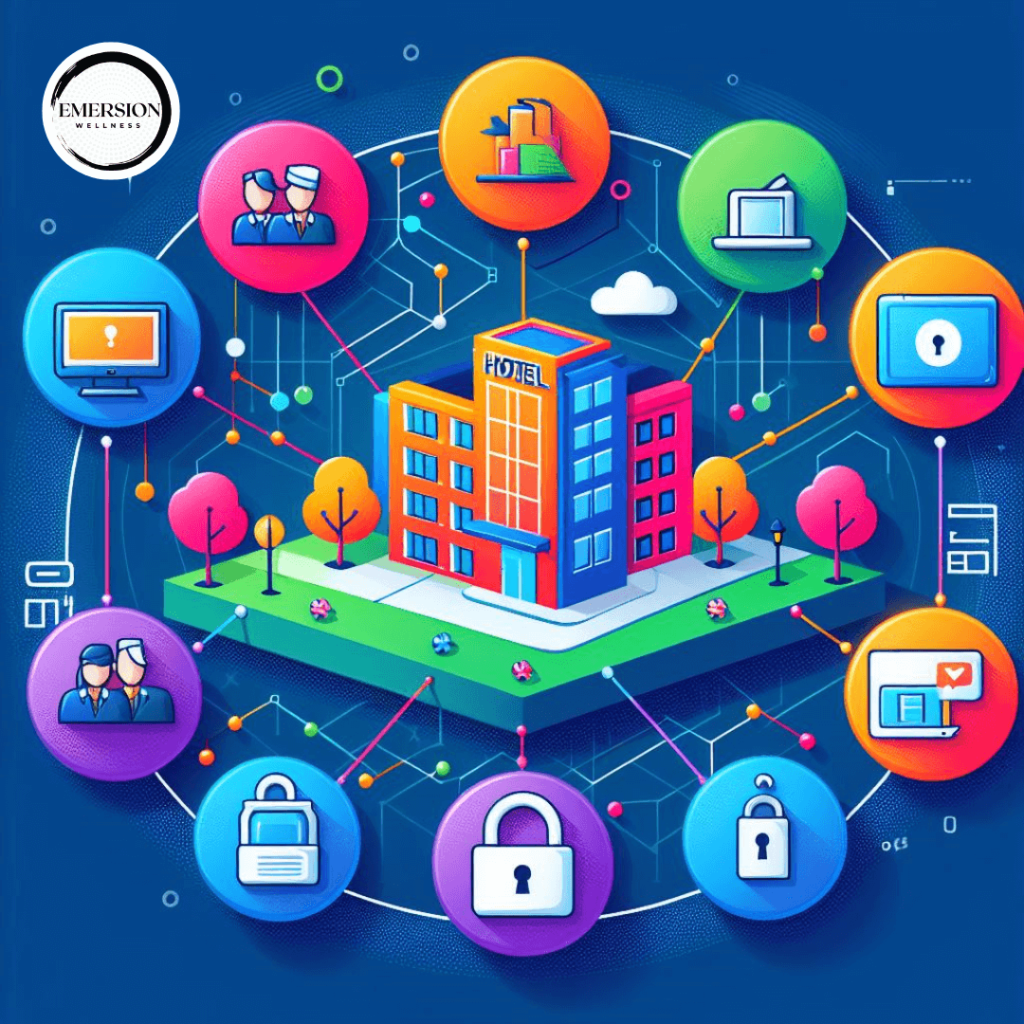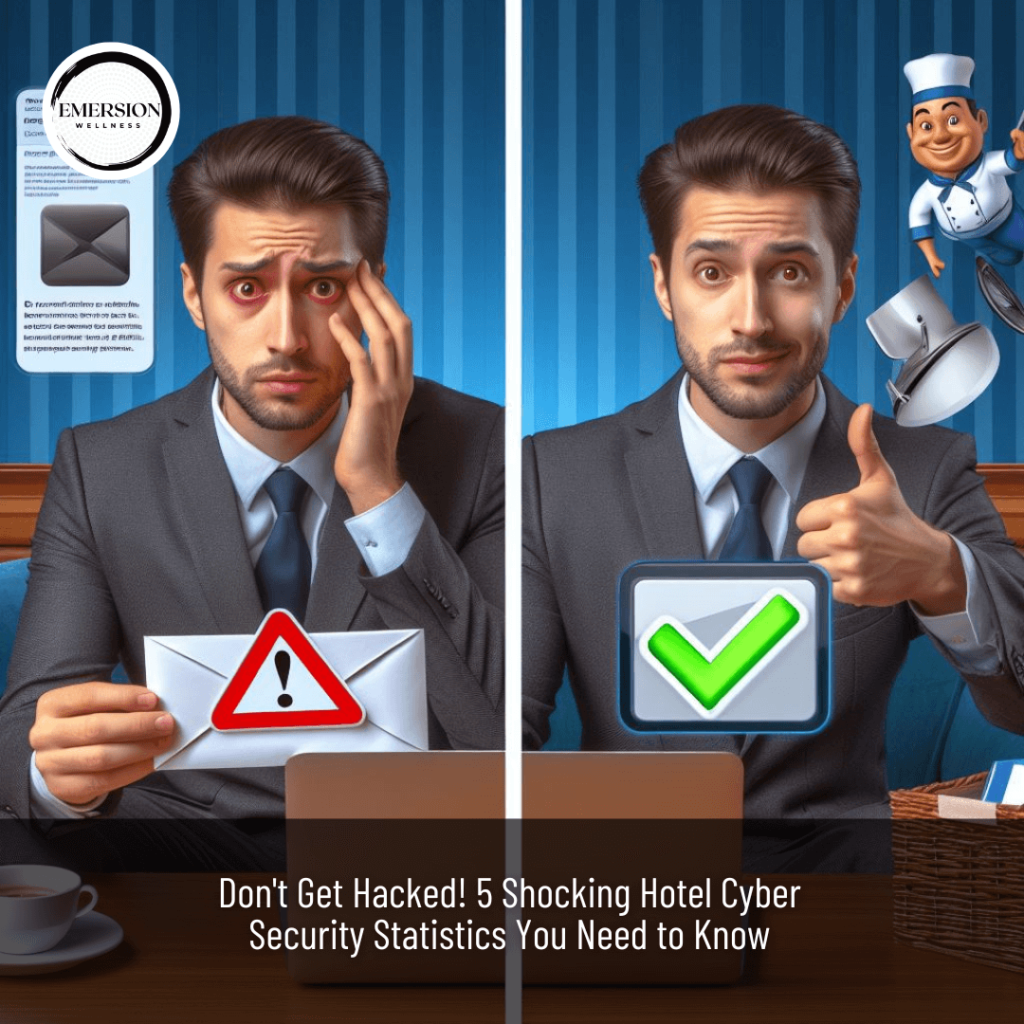The hospitality industry thrives on trust. Guests entrust hotels with their personal information, financial details, and even the security of their belongings during their stay. In today's digital age, this trust extends to the virtual realm as well.
But with the rise of cybercrime, hotels are facing a new challenge: protecting guest data from hackers. A recent study by Hospitality Technology: found that a staggering 70% of hotels have experienced at least one cyberattack in the past year. These attacks can range from phishing scams targeting guest information to malware intrusions that disrupt hotel operations.
This article dives deep into the world of Hotel cyber security, outlining the key threats, offering practical solutions, and ultimately helping you maximize your revenue by protecting your guests and your business.
Critical Takeaways:
- Hotel cyber security breaches are a growing threat.
- Data breaches can damage guest trust and hurt hotel revenue.
- Investing in hotel cyber security protects your guests and your business.
Why Should Hotels Prioritize Cybersecurity?
There are several compelling reasons why hotels should prioritize cybersecurity. Here are just a few:
1. Protect Guest Information:
Hotels collect a significant amount of guest data, including names, addresses, credit card details, and passport information. A data breach can expose this sensitive information, putting guests at risk of identity theft and financial fraud.
2. Maintain Guest Trust:
Guests expect hotels to take their privacy and security seriously. A data breach can shatter guest trust, leading to negative online reviews and a decline in bookings. According to a Pegasystems: https://www.pegasystems.com/ report, 81% of travellers would be less likely to stay at a hotel that has experienced a data breach.
3. Avoid Financial Loss:
Data breaches can be incredibly costly for hotels. In addition to the potential fines and legal fees, hotels may also have to invest in repairing damaged IT infrastructure and compensating affected guests.
4. Mitigate Reputational Damage:
A cyberattack can severely damage a hotel's reputation. Negative media coverage and social media backlash can take years to overcome, impacting future bookings and profitability.
5. Ensure Business Continuity:
Many hotel operations rely on digital systems, such as reservation systems, access controls, and point-of-sale systems. A cyberattack that disrupts these systems can bring hotel operations to a standstill, leading to lost revenue and guest frustration.
The Top 3 Hotel Cyber Security Threats
Here's a closer look at three of the most common hotel cyber security threats:
1. Phishing Attacks
Phishing emails are cleverly disguised emails designed to trick recipients into revealing personal information or clicking on malicious links. These emails often appear to be from legitimate sources, such as banks, credit card companies, or even the Hotel itself. Once a guest clicks on a malicious link, they may be directed to a fake website that looks like a real hotel website. Here, they may be tricked into entering their login credentials or credit card information.
2. Malware Attacks
Malware is malicious software that can be installed on a computer system through various means, such as clicking on a malicious link or opening an infected attachment. Once installed, malware can steal data, disrupt operations, or even hold systems hostage for ransom (ransomware).
3. Point-of-Sale (POS) System Attacks
Hotels rely heavily on POS systems to process guest payments. Hackers may target these systems to steal credit card information or inject malware into the system.
Building a Robust Hotel Cyber Security strategy

Here are five essential steps to build a robust hotel cyber security strategy and minimize the risk of cyberattacks:
1. Conduct a Cybersecurity Risk Assessment:
The first step is to identify your Hotel's vulnerabilities. Conduct a comprehensive cybersecurity risk assessment to understand the types of data you collect, how it is stored, and the potential threats you face.
2. Implement Strong Access Controls:
Limit access to sensitive data to authorized personnel only. Use strong passwords and implement multi-factor authentication (MFA) for critical systems. Additionally, consider segmenting your network to restrict access between different departments.
3. Educate Employees:
Employees are often the first line of defence against cyberattacks. Train your staff on how to identify phishing emails, avoid malware, and report suspicious activity.
4. Secure Your Wi-Fi Network:
Offer a secure Wi-Fi network for guests, separate from the Hotel's internal network. Use a strong encryption protocol (WPA2) and require guests to use a password to access the network.
5. Update Software Regularly:
Software vulnerabilities are a common entry point for hackers. Regularly update all software and operating systems on hotel computers, including point-of-sale systems and internet-connected devices (like smart TVs).
6. Back Up Your Data:
Regularly back up your data to a secure offsite location. This will allow you to recover your data quickly in the event of a cyberattack.
7. Develop a Data Breach Response Plan:
In the unfortunate event of a data breach, it's crucial to have a plan in place. This plan should outline the steps you will take to contain the breach, notify affected guests, and mitigate the damage.
8. Invest in Security Solutions:
Consider investing in security solutions, such as firewalls, intrusion detection systems, and endpoint protection software. These solutions can help to detect and prevent cyberattacks.
9. Partner with a Cybersecurity Expert:
Cybersecurity is a complex field. Consider partnering with a cybersecurity expert who can help you develop and implement a comprehensive cybersecurity strategy.
10. Raise Guest Awareness:
Educate your guests about cybersecurity best practices. Inform them about the steps your Hotel takes to protect their data and offer tips on how they can stay safe while using the Hotel's Wi-Fi network or accessing their online accounts during their stay.
The Cost of Inaction: A Case Study
Data breaches can be incredibly costly for hotels. Here's a real-world example:
In 2014, the Marriott International hotel chain suffered a massive data breach that exposed the personal information of an estimated 500 million guests. The breach cost Marriott hundreds of millions of dollars in legal fees, fines, and remediation efforts. The company also faced significant reputational damage and a decline in bookings.
This case study highlights the importance of taking hotel cyber security seriously. Investing in cybersecurity is an investment in your Hotel's future.
Maximizing Revenue Through Hotel Cyber Security
While cybersecurity may seem like a cost centre, it can actually be a driver of revenue. Here's how:
1. Increased Guest Trust:
By demonstrating a commitment to cybersecurity, you can build trust with your guests, leading to repeat bookings and positive online reviews. Guests are more likely to book with a hotel that they trust to protect their data.
2. Enhanced Brand Reputation:
A strong cybersecurity posture can enhance your Hotel's brand reputation and position you as a leader in the hospitality industry. This can attract new guests and command premium room rates.
3. Improved Operational Efficiency:
Cybersecurity measures, such as regularly updating software, can help to prevent costly system outages and disruptions. This can improve operational efficiency and reduce downtime.
4. Increased Insurance Coverage:
Some insurance companies offer discounts on premiums for hotels with strong cybersecurity practices. This can save your hotel money in the long run.
5. A Competitive Advantage:
In today's digital age, cybersecurity is a competitive advantage. By prioritizing cybersecurity, you can differentiate your Hotel from the competition and attract guests who are increasingly concerned about data privacy.
Conclusion
Hotel cyber security is no longer an option; it's a necessity. By taking steps to protect your guests' data, you can safeguard your Hotel's reputation, maximize revenue, and ensure the continued success of your business.
FAQs on Hotel cybersecurity
-
What are some signs that my Hotel may have been hacked?
Unusual activity on guest accounts
Slow or unresponsive computer systems
Missing or corrupted data
Increased phishing attempts targeting hotel staff -
What should I do if I suspect my Hotel has been hacked?
Isolate the affected systems to prevent further damage.
Contact a cybersecurity expert to investigate the breach.
Notify affected guests and law enforcement.
Develop a plan to remediate the breach and prevent future attacks. -
How can I train my employees on hotel cyber security?
There are a number of ways to train your employees in hotel cyber security. You can offer online training modules, conduct in-person workshops, or partner with a cybersecurity training company.
-
What are some best practices for securing guest Wi-Fi networks?
There are a number of ways to train your employees in hotel cyber security. You can offer online training modules, conduct in-person workshops, or partner with a cybersecurity training company.
-
How can I make my Hotel's data breach response plan more effective?
Develop a clear communication plan for notifying affected guests, law enforcement, and regulatory agencies.
Regularly test your data breach response plan to ensure it is effective.
Have a designated team in place to handle a data breach.
Keep your data breach response plan up-to-date. -
What are some emerging cybersecurity threats that hotels should be aware of?
Ransomware attacks: These attacks encrypt a hotel's data and demand a ransom payment to decrypt it.
Supply chain attacks: These attacks target third-party vendors that hotels use, such as point-of-sale system providers, to gain access to hotel data.
Internet of Things (IoT) attacks: As more and more hotels adopt IoT devices, such as smart TVs and smart locks, these devices become new targets for hackers. -
How can I stay up-to-date on the latest hotel cyber security threats?
Subscribe to cybersecurity newsletters and blogs.
Attend cybersecurity conferences and webinars.
Follow cybersecurity experts on social media.
Conduct regular cybersecurity risk assessments. -
What are some additional resources for learning more about Hotel cyber security?
National Institute of Standards and Technology (NIST) Cybersecurity Framework for Hospitality and Tourism: https://www.nist.gov/news-events/news/2021/03/nist-offers-cybersecurity-guide-tailored-hospitality-industry
American Hotel & Lodging Association (AH&LA) Cybersecurity Resources: https://www.hoteliga.com/en/blog/top-10-cybersecurity-best-practices-for-the-hospitality-industry -
Is cybersecurity expensive for hotels?
The cost of cybersecurity can vary depending on the size and complexity of your Hotel. However, there are a number of cost-effective cybersecurity measures that hotels can implement. These measures can help to significantly reduce the risk of a cyberattack, which can be far more expensive than preventative measures.
-
How can Emersion Wellness help my Hotel with cybersecurity?
Cybersecurity risk assessments
Development and implementation of cybersecurity policies and procedures
Employee cybersecurity training
Security awareness programs for guests
Managed security services
Remember, investing in hotel cyber security is an investment in your Hotel's future.
Don't let a cyberattack derail your Hotel's success. Contact Emersion Wellness today to learn more about how we can help you develop and implement a comprehensive hotel cyber security strategy. In addition to cybersecurity solutions, Emersion Wellness also offers a highly-regarded weight loss program that has been proven to increase hotel revenue through various means, including increased room bookings, spa reservations, and food and beverage sales. Let Emersion Wellness help you elevate your Hotel's security and profitability.
Also, see A 360-Degree Best Hotel Sales Strategy Guide for Maximum Revenue

I'm Nathan Baws, a nutrition nerd, exercise and weight loss expert, and an unwavering advocate for good health. As the founder of Emersion Wellness, I'm passionate about crafting Seamless Weight Loss Programs to supercharge hotel revenue and transform lives. We've pioneered the World's First Plug & Play Weight Loss Programs for top hotels and resorts, sparking a wellness revolution. Beyond my professional journey, you'll often find me hiking, swimming, and riding the waves, embracing every moment in nature. Join me on this exhilarating journey towards diet, health and wellness.

